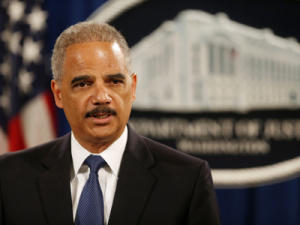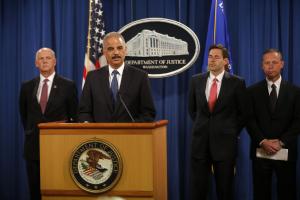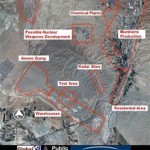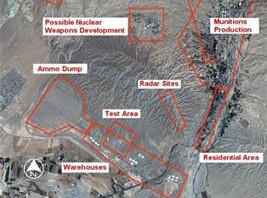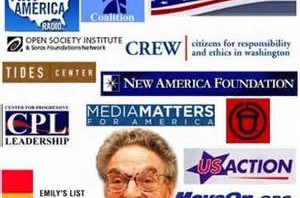Do you ever wonder who your neighbor really is? Do you ever wonder how people actually are allowed into the United States? Do you ever wonder who approves visas for foreigners and what they are doing when they get here?
Sheesh:
Item one —>>
WASHINGTON — To those who lost loved ones in the suicide bombing of the American Embassy in Beirut, Lebanon, in April 1983, it is often called “the forgotten bombing” — overshadowed by an even deadlier attack on a Marine barracks at the Beirut airport six months later.
Now, a new book shines a spotlight on the embassy bombing, which killed 63 people, 17 of them American, including eight Central Intelligence Agency officers. One of those was Robert C. Ames, a C.I.A. operative who is the hero of the book, “The Good Spy: The Life and Death of Robert Ames,” by Kai Bird.
Mr. Bird explores Mr. Ames’s shadowy path in the Middle East, where he formed an unlikely friendship with the intelligence chief of the Palestine Liberation Organization and used it to try to draw the Israelis and Palestinians together in peace negotiations.
But in sifting through the long-dead embers from the embassy bombing, Mr. Bird makes a startling assertion: that an Iranian intelligence officer who defected to the United States in 2007 and is still living here under C.I.A. protection, oversaw the 1983 bombing, as well as other terrorist attacks against Americans in Lebanon.
“When it comes out that at least one of the intelligence officers associated with planning these truck bombings is living in the U.S., the relatives of these victims are going to go ballistic,” Mr. Bird said in an interview last week.
“This is a classic intelligence dilemma,” he continued. “When do you deal with bad guys? When do you agree to give them asylum? In my opinion, this goes over the line.”
Mr. Bird, who shared a Pulitzer Prize with Martin J. Sherwin for their book, “American Prometheus: The Triumph and Tragedy of J. Robert Oppenheimer,” spoke to more than 40 current and retired C.I.A. officers, though the agency declined to cooperate with him. He also consulted numerous sources in the Israeli Mossad and in Lebanon, including a Lebanese businessman with ties to the Palestine Liberation Organization.
A spokesman for the C.I.A., Todd Ebitz, declined to comment on Sunday about Mr. Bird’s assertion. “As a general rule, the C.I.A. does not comment on allegations that someone may or may not have worked as a source for the agency,” Mr. Ebitz said.
The disclosures in “The Good Spy” are timely, given that the United States is in a critical phase of negotiating a nuclear deal with Iran. The decision to grant asylum to the Iranian intelligence officer, Ali Reza Asgari, was made by the George W. Bush administration in 2007, Mr. Bird writes, because he had valuable information about Iran’s nuclear program, including that it had built a uranium enrichment facility at Natanz.
Mr. Asgari’s information has since been superseded by new disclosures, including that a second enrichment facility had been built in a mountain near the holy city of Qum. But even now, a critical negotiating issue is how many centrifuges Iran will be allowed to operate at these facilities.
On paper, Ali Reza Asgari would be a treasure trove for the C.I.A. He joined the Islamic Revolutionary Guards Corps soon after the 1979 revolution, and was sent to Lebanon in 1982, when Iran was bankrolling a wave of terrorism against Americans, through its proxy, the Islamic militant group Hezbollah. Later, he returned to Iran and rose to a senior post in the Revolutionary Guards, which oversees the nuclear program.
“He would have the crown jewels,” said Robert Baer, a retired C.I.A. agent who had his own career in the Middle East and spoke to Mr. Bird for his book.
But while Mr. Baer said Mr. Bird’s reporting is persuasive — he said he knows some of the sources the author consulted in the region — he noted that the book contains no smoking gun establishing Mr. Asgari’s whereabouts. Indeed, Mr. Asgari may no longer be in the United States.
Mr. Bird said that when he asked a former senior Bush official about the decision to grant Mr. Asgari asylum, he received a cryptic reply: “At the unclassified level, I cannot elaborate on this issue.” He cited a report in Der Spiegel, the German newsmagazine, that Mr. Asgari twice called a fellow Iranian defector — from Washington, where he had been held in a C.I.A. safe house, and from “somewhere in Texas.”
Stuart H. Newberger, a Washington lawyer who represents victims of the 1983 attack, said he believed the book was accurate, though he could not corroborate the Asgari disclosure himself. He said he had supplied Mr. Bird with trial transcripts and internal government documents he had obtained for his litigation.
“Asgari got a get-out-of-jail-free card because of the Iran nuclear issue,” Mr. Newberger said.
For the Obama administration, Mr. Bird’s revelations could be awkward. Mr. Newberger said it should make terrorism an issue in any negotiation about relaxing sanctions against Iran. But the White House has tried to keep the nuclear negotiations tightly focused on technical questions of Iran’s enrichment capability and international inspections.
“The Good Spy” is a vivid reminder of Iran’s prolific sponsorship of terrorism against the United States — a not-so-distant legacy. In January, Iran’s foreign minister and the leader of its nuclear negotiating team, Mohammad Javad Zarif, laid a wreath at the grave of Imad Mugniyeh, a lethal Hezbollah operative who the C.I.A. believes had an operational role in the embassy and barracks bombings. Mr. Mugniyeh was assassinated in 2008, probably by the Mossad, on information supplied by Mr. Asgari, who acted as his control officer during the 1980s, according to Mr. Bird.
None of this history is helpful to a White House eager to conclude a landmark nuclear deal. “People just don’t want to hear about Iranian terrorism,” Mr. Baer said. “Nobody has the appetite to dig this up. You focus on the battle you can win, which is nuclear.”
For Anne Dammarell, a retired American aid officer gravely injured in the Beirut bombing, Mr. Bird’s book solved a mystery of who masterminded the attack that nearly killed her.
But she said she was not outraged by the disclosure about Mr. Asgari. In the murky world of spying, she said, such trade-offs were sometimes necessary. “Most people understand that deals get cut,” she said. “You can be a very corrupt person and still die in your sleep.”
Item two –>
By JOSEPH FITSANAKIS | intelNews.org
Some of our longtime readers will recall the case of Dongfan “Greg” Chung, a Chinese-born American engineer for Boeing, who was convicted in 2009 of passing US space program secrets to China. The case is arguably far more important than it might have seemed at the time, as Chung was technically the first American to be jailed for economic espionage. Many at the Federal Bureau of Investigation view the Chung conviction as a landmark case for providing clear legal proof of Chinese espionage in the US. Little is known, however, about how the FBI managed to uncover Chung’s espionage activities, which are believed to have gone on for nearly three decades. In the latest issue of The New Yorker, Yudhijit Bhattachargjee reveals for the first time the fascinating background of how the Bureau got to Chung. It did so through another American engineer of Chinese origin, named Chi Mak. Unlike Chung, who was ideologically committed to Maoism and was recruited by Chinese intelligence after immigrating to the US, Mak was an accredited intelligence operative who was allegedly specifically planted in the US by the Chinese. He came to America from Hong Kong in 1979 and worked for California-based defense contractor Power Paragon. He almost immediately began stealing secrets relating to US Navy systems. The FBI first started monitoring Mak and his wife, Rebecca, in 2004, following a tip. The effort evolved in one of the Bureau’s biggest counterintelligence cases, involving elaborate physical and electronic surveillance that lasted for nearly 18 months. During that time, FBI and Naval Criminal Investigation Service agents installed surveillance cameras outside the Maks’ residence, followed the suspects around, and monitored their telephone calls. Eventually, the surveillance team managed to acquire a warrant allowing them to clandestinely enter the Maks’ home and conduct a secret search. The nondestructive entry team discovered numerous stacks of secret documents “some two or three feet high” all around the suspects’ house. Among the findings was an address book containing the names of other engineers of Chinese origin living in the state of California. That, says Bhattachargjee, was the first time the FBI came across Chung’s name. During a subsequent covert entry into Mak’s house, the surveillance team installed a surveillance camera. The information collected from the camera led the FBI to Mak’s younger brother, Tai Mak, who had been living in the US since 2001, along with his wife, Fuk Li, and their two children. It turned out that Tai was acting as a courier, transporting to China various pieces of intelligence collected by his brother. The FBI eventually managed to arrest Tai and his wife at the Los Angeles International Airport as he was preparing to leave the US, carrying an encrypted CD with secret documents stolen by his brother. In 2007, Chi Mak was sentenced to 24.5 years in prison, Tai Mak to 10 years, and Chi’s wife, Rebecca, to three years. The remaining members of the two families were deported to China.




